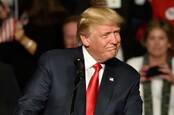Tech titans hide in shadows awaiting Trump tariff threats
Being more diplomatic than the politicians makes sense amid fear of upsetting the next US President
A eerie quiet has descended upon elements in the tech exec community, and even the typically more vocal souls in the highest seats in corporations are scared to put the wrong foot forward ahead of a certain President Elect coming to power.
A hike in tariffs is one of the levers that Donald Trump has committed to pulling when he becomes the 47th president. He's already threatened to increase them by 25 percent on all goods coming from Canada and Mexico, and promised 60 percent duty on products imported to the United States from China.
This would dramatically upturn entire sectors from smartphones to PCs and all the other hardware currently made in China, the factory of the world.
Trump made the declaration via his Truth Social Site, with the aim of returning jobs to America. Not that his rhetoric centered on job generation on home soil. He instead talked about tariff rises in the context of stopping drugs coming into the States and curbing illegal immigration, no doubt playing into the concerns of some of his supporters.
The upshot of tariff rises, however, could be increased prices for consumers - the very same working people Trump is claiming to want to help - and business customers.
The Register got some time with one exec at a well known US vendor with manufacturing outposts across the world and asked what his position on Trump's tariffs were. Treading very cautiously, he asked us keep him anonymous.
He pointed out that then-candidate Kamala Harris and the Democrats were threatening to raise corporation tax while Trump's Republicans wanted to up tariffs.
"Both are bad, because ultimately, who pays is corporations and consumers, because you have to work through that process, whether it's price increase or lower earnings," the CEO told us.
With Trump set to sweep to power as President elect, "we're going to work with his administration to understand what is the right balance. There is a process by which, you know, the Business Roundtable, which is 200 CEOs, engage with the administration for things like tax, R& D credits and the like."
The US, he agreed, has to maintain a leadership position of the global stage.
"Ultimately, if any of these actions impacts innovation it is bad," the CEO told us. "So I think you know, any administration wants to make sure the United States continues to innovate and we play in the market where we can play and win."
Other bosses at multi-billion dollar tech corporations didn't want to upset Trump either, especially not before he's even reached the White House. "We don't want to make an enemy of him," a source told us.
Another who spoke on condition of anonymity told The Register that he'd "prefer an environment that is open and does not hurt innovation… I assume that simply putting limits on technology and availability of it can make innovation slower.
"Regarding tariffs I am happy to comment more when we know more, we are truly global and have adapted MANY times to different regulations and will continue to do so," he added in an more hopeful tone.
One of the CEOs who was quizzed decided to side-step the question entirely, opting for self censorship even when we assured him of anonymity.
He said he "avoids weighing into the political realm as it's impossible to fully represent the views of all our colleagues and customers. If we run a great business, the rest will take care of itself."
Diplomacy is clearly something that these three tech execs are mindful of before Trump is even sworn in again in January.
As the The Reg pointed out ahead of the US elections in early November, Trump said: "A tariff is a beautiful thing but it's got a bad image… You can stop wars with tariffs."
Just maybe not trade wars.
There is a reason why numerous tech execs are flocking to Trump's Mar-a-Lago estate for private dinner with the incoming president. Sergey Brin, Jeff Bezos, Mark Zuckerberg, and Elon Musk have all dined there.
Steve Brazier, Fellow at Informa, told us:
"Predicting the impact on Trump's tariffs right now, is virtually impossible since there is so much uncertainty regarding their size, which products are impacted, and whether they apply to only China, or also to Canada and Mexico, and, perhaps, even the BRICS."
- If Trump gets elected, get your tech buying done asap
- SoftBank pledges to pour $100B into US, create 100,000 jobs in Trump's second term
- Musk's lawyer asks the SEC to quit pestering the shy and retiring billionaire
- China gorging on silicon before Uncle Sam slams the door
The trend of tech businesses shifting production out of China to India, Vietnam, and southeast Asia will continue, he added. "We will also see more component manufacturing taking place in those countries, adjacent to existing assembly plants to reduce the potential risk of tariffs being imposed on Chinese made components.
"Other consequences will include a rise in the prices of tech, a strengthening of the US dollar, and a one-off rise in inflation at the time the tariffs begin. The higher dollar and inflation are both the opposite of what Trump says he wants, and so are a contradiction.
"Another concern will be the reaction of the US public to price rises. It seems unlikely that the population would, for example, tolerate a threatened 60 percent rise in the price of an iPhone. So, there will be a lot of haggling about the details, which is why so many CEOs have been heading to Florida recently!" ®


